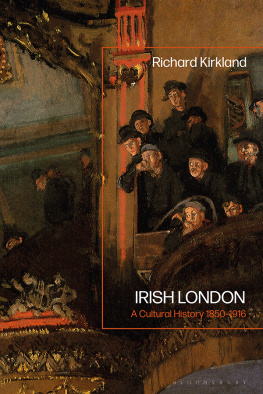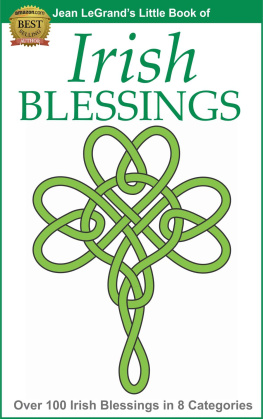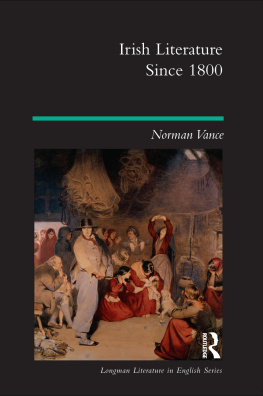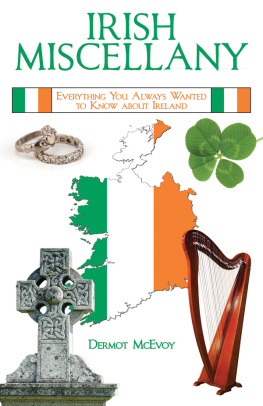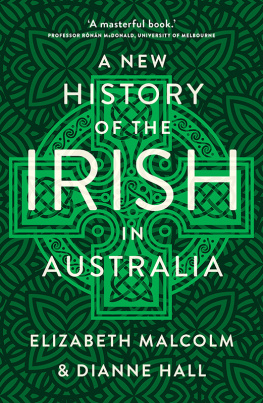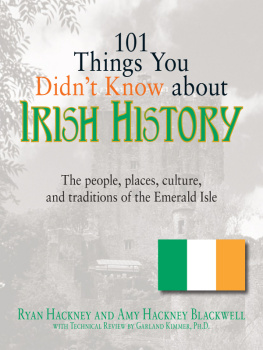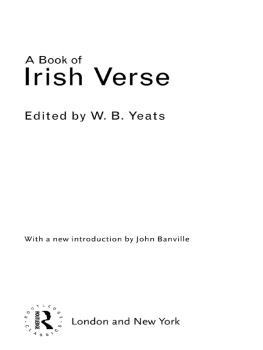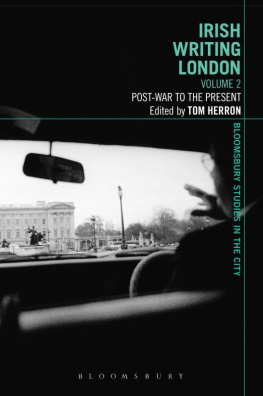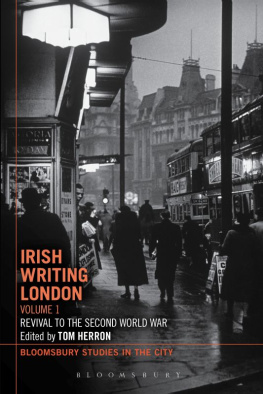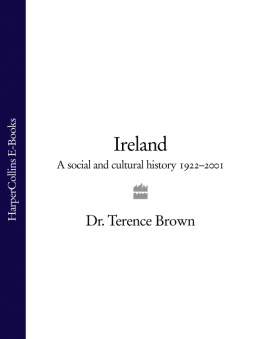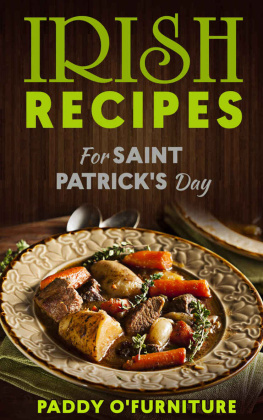I have been working on this book for some time and I suspect it would never have been completed without the advice, encouragement and friendship of many people over the years. It is a privilege to have this opportunity to express my gratitude to them. Following a four-year period as Head of the Department of English, Kings College London granted me an extended period of research time. I am grateful to Kings for this and for the institutions overarching commitment to research in the humanities. Of equal importance was the award of a twelve-month Leverhulme Research Fellowship in 2019. I would like to place on record my sincere thanks to the Leverhulme Trust for enabling this work. I would also like to thank the journals New Hibernia Review, The London Journal and Nordic Irish Studies, where parts of this research have previously appeared. The image Bad News in Troubled Times: An Important Arrest Has Been Made, That of a Young Man Named by Margaret Allen is reproduced courtesy of Irelands Great Hunger Museum, Quinnipiac University, Hamden, CT.
The academic community at Kings is remarkable in its collegiality and it has always been a great source of support and kindness. I especially would like to thank Rebecca Dean, Janet Floyd, Paul Gilroy, Russell Goulbourne, David Green, Eleanor Jubb, Clare Lees, Jo Malt, Alan Marshall, Josephine McDonagh, Darren Munn, Lucy Munro, Dorothy Pearce, Clare Pettitt, Alan Read, John Stokes, Mark Turner, Neil Vickers and Patrick Wright. I have supervised a number of very gifted PhD students during my time at Kings and, in the context of the research in this project, I would particularly like to acknowledge the work of Niamh Campbell, George Legg, Melanie McMahon, Camilla Mount and Helen Saunders. I have learned much from their brilliant research.
I am hugely grateful to the Irish Studies community in Great Britain, Ireland and the United States, especially Shane Alcobia-Murphy, Matthew Campbell, Joe Cleary, Claire Connolly, Jeffrey Dudgeon, Brian Gilmore, Declan Long, Caroline Magennis, Brighid Mhic Shein, Catherine Morris and James Rogers. Colin Graham has always been a generous and wise friend and provided very astute feedback on a troublesome aspect of this work at an early stage. Members of staff at the British Library have been endlessly helpful, and I would particularly like to acknowledge their efforts in sustaining academic research during the Covid-19 restrictions. Although I do not know them all personally, I would also like to thank the many scholars in this field whose work has been a source of inspiration (and frequently intimidation), especially Frances Flanagan, Roy Foster, Sheridan Gilley, Reginald Hall, John Hutchinson, Mo Moulton, Ian Sheehy and Roger Swift.
Tim Bricheno, Conor Hanna, Emmett Hanna, Matthew Kirkland, Paul Morris, Vincent Newland and Helen Stoddart have been resolute in their kindness and generosity of spirit, while my many friends at the Pineapple pub in Kentish Town have been a constant source of encouragement, even while finding humour in the seemingly ludicrous nature of my preoccupations. My parents, Brian and Shelagh Kirkland, understand the scale of the debt I owe them, as does Emily Nadira Jones, who has been steadfast in her love and support.
Finally I would like to thank my daughters, Esme and Amity. Despite the fact that this project is older than they are, they have always expressed forthright opinions about its intellectual direction and, indeed, my ability to bring it to a proper conclusion. This book is dedicated to them with all my love and affection.
London again! That great and terrible city that forever stretches its tentacles out towards people who are hundreds, thousands, of miles away, and draws them inexorably towards her, in spite of themselves, and remakes them in her own image, to swallow them up, to recreate them.
Pdraic Conaires Irish-language novel Deoraocht (Exile) from 1910 describes the terrible experiences of an Irish exile cast adrift in London. Looking for work in the city, Michel Maolin from Galway is hit by a car and badly maimed, losing an arm and a leg and suffering severe injuries to his face. Facing life as a poor cripple, at only twenty-seven years of age, he soon exhausts the 250 he receives in compensation for the accident and accepts an offer of work as a circus freak.
Deoraocht was a significant cultural achievement. The winner of a Gaelic League Oireachtas na Gaeilge literary award on its publication and described by Angela Bourke as the earliest example of modernist fiction in Irish, it describes the collision of Irish-speaking Ireland with English-speaking (or, to be more precise, polyglot) London
Reading Deoraocht in this way enables it to appear typically of its time a text of the early twentieth-century Irish cultural revival marked by its preference for what was termed an Irish-Ireland cultural vision and by a concomitant assumption that London is little more than a place of temptation and moral degradation for those young Irish foolish enough to make the crossing. Indeed, in its review of the novel the Gaelic Leagues newspaper An Claidheamh Soluis noted that the exile life of those of our race who go under has never before been pictured as it is pictured here, never before in Irish, and never so well in English. The picture is not a pleasant one. It could not be pleasant, but the book adds a new reason for the study of Irish and for its revival. Such images verge on the hallucinatory Deoraochts vision of the city is frequently distorted and even phantasmagorical as it is filtered through Michels language and cultural experience but they offer a sensory stimulation that he could not find in Galway. Moreover, despite the novels insistence on the essential loneliness of exile, it is also careful to present Londons Irish community as a significant presence and certainly not one cast adrift from its cultural hinterland. In Little Ireland, the area of the city where Michel lives, the people had inherited the traditions of bards and poets, all the neighbours knew each other, and they had social gatherings in the evenings, where you would find fiddlers and pipers and flute-players. The novel adds further detail about the extent of this community:
There would be a man there who could relate the contents of Keatings History of Ireland, as well as a man who knew nothing about it. And if somebody were to disagree with anything the savant said, he would just go to the big trunk he had brought with him from Ireland and take out a parcel wrapped in linen. He would open the parcel and take out a large book in manuscript. And how careful he was of that book! He would then show you in black and white where you had been wrong. And when he closed the book to put it away he would look at you as if to say. Now what have you to say for yourself? But he never said a word. And the daytime trade of this man who spent his evenings reading history and learning poetry was the trade of the pick and shovel.
This small population of exiles in a foreign city kept up the manners and customs of the people of the ancient Irish nation. The Irish heritage of language, music and literature, which rich people at home had abandoned in their efforts to imitate the English, who would as soon have seen them at the bottom of the sea, was kept alive by these people. They understood in their own way that a race should guard the culture which had come down to them from their ancestors and they guarded it like a precious jewel.

